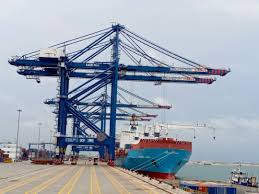The $1.5 billion Lekki Deep Seaport is looking to more than double its cargo handling operations by the end of 2025, aiming for 500,000 Twenty-foot Equivalent Units (TEUs) after processing 222,000 containers in the first half of the year. This was revealed by the Deputy Managing Director of Lekki Port, Mr. Daniel Odibe, during a press briefing in Lagos on Thursday.
Mr. Odibe said that although the port has the capacity to handle up to 1.2 million TEUs annually, it is currently operating at only about 20 percent capacity. He attributed the low volume to ongoing economic challenges, particularly the removal of fuel subsidies and the sharp depreciation of the Naira, which have slowed down the volume of imports into Nigeria.
He, however, noted that cargo volumes are beginning to recover as the economic outlook improves. “Volumes fell because of the depreciation of the Naira and the removal of fuel subsidies, which affected importation. But we are gradually picking up as the Naira stabilises,” he said.
According to him, in its first full year of operation in 2023, the port handled 54,289 TEUs. By June 2025, it had already processed 222,000 containers and is now on track to hit 500,000 TEUs by year-end. He added that the Port currently receives between 10 to 12 vessels monthly and is actively expanding its international transhipment operations.
“We are already transhipping to ports in Togo, Benin Republic, Ghana, Abidjan, and even some landlocked countries. Our international transhipment volume has increased substantially. It shows our growing influence as a regional maritime hub,” Odibe said.
He pointed out that Lekki Port’s ability to serve as a transhipment centre for West and Central African countries is helping to fill the gap left by reduced import volumes. With deep berths and modern facilities, the port is positioning itself as the preferred gateway for regional and international cargo traffic.
Providing an update on efficiency, Odibe noted that vessel turnaround time at the port is currently 48 hours. For trucks, the turnaround time stands at about one hour and 25 minutes, while cargo dwell time is estimated at 16 days. Though these figures still fall short of global best practices, the management said it is working to improve operations further.
Also speaking, the Managing Director of Lekki Port, Mr. Wang Qiang, reaffirmed the port’s commitment to delivering world-class services. Represented by the Chief Operating Officer, Mr. Young Qiang, he stated that Lekki Port remains focused on pushing operational boundaries and becoming the maritime benchmark in West Africa.
“We continue to push the envelope and set the bar higher to uphold our position as West Africa’s deepest seaport. The result of our commitment to global standards is visible in the strategic impact we are making across Africa’s maritime trade map,” Mr. Young said.
He said the management is leveraging technology and innovation to increase operational efficiency and contribute to shaping regional trade. According to him, the Lekki Port project is not just about Nigeria but about transforming logistics and cargo flow across West Africa.
Since its inauguration, Lekki Port has attracted attention as Nigeria’s first deep seaport and one of the most advanced in the region. Located in the Lekki Free Trade Zone, Lagos, the port is expected to drive industrial growth, attract foreign investment, and ease congestion at the Apapa and Tin Can Island Ports.
Despite a challenging economic climate, port officials remain optimistic that the Lekki Port will exceed expectations this year and in the years to come. The ongoing transhipment activities, operational improvements, and regional collaborations are all part of its long-term growth strategy.
